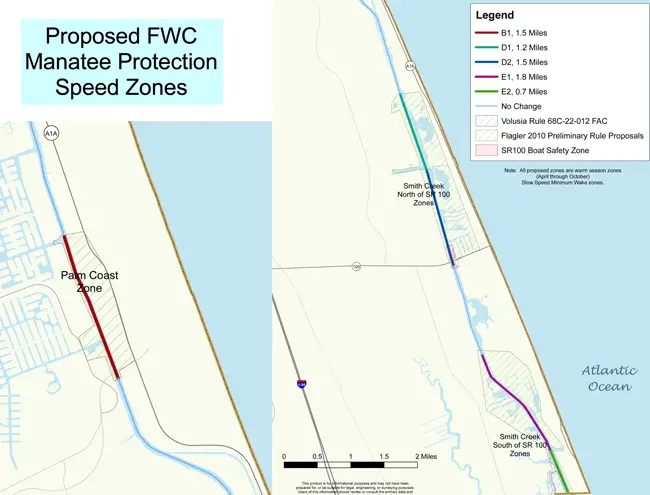
Flagler County’s 10-member manatee-rules committee is at the half-way point: when the committee meets at 5:30 this afternoon, at the Emergency Operations Center in the county government complex, it will have 30 days left to write a report to the Florida Fish and Wildlife Conservation Commission, outlining local recommendations regarding proposed boating speed zones in the Intracoastal. (The meeting is open to the public.)
Click On:
- How a Boating Guru Turned Manatee Advocate
- 10 Named to Flagler’s Manatee Rules Panel
- Hanging With Manatees
- Marineland Mobilizes Against BP Oil Spill — and Beyond
Local boating interests oppose speed zones. Fish and Wildlife says they’re warranted as more manatees are dying from collisions with boats (among other reasons), though last year just one manatee death was attributed to a boating collision. Manatees, of course, don’t have to be killed for the point to be made that they’re vulnerable to boating collisions: Many a manatee bears scars of collisions and propeller slashes.
The local committee was appointed by the Flagler County Commission. State law requires the committee to be established whenever the state is proposing new manatee rules. The committee is required to be evenly split between manatee and boating advocates–at least officially. On paper, that’s what Flagler’s committee looks like. In reality, the committee is clearly stacked in favor of boating advocates: at least two members of the committee listed as manatee advocates have more boating than manatee interests in their background.
The committee’s authority is limited to an advisory role. In the end, Fish and Wildlife will make the decision on speed zones regardless. But the state agency has historically taken local rules committee recommendations seriously. Nothing is a done deal (yet).
The local rules committee met twice before — on May 13 and on May 26. (Read the May 13 minutes of that meeting here, and the May 26 minutes here.)
Fish and Wildlife is proposing the following speed zones along the length of the Intracoastal, from the Flagler-Volusia county line to Marineland. They’re as follows:
- An area extending from the northern shoreline of the central Palm Coast residential canal to approximately 300 feet south of the Dunes Hammock Bridge.
- Smith Creek extending from the southern shore of Lehigh Canal northward to just north of the Silver Lake Marina.
- Smith Creek extending from approximately 300 feet south of the State Route 100 bridge to the southern shore of the Lehigh Canal.
- An area extending approximately 1.8 miles north from the Gamble Rodgers
Memorial State Recreation Area boat launch canal in Smith Creek, inclusive of all associated canals. - An area extending from the Volusia County line north to the Gamble Rodgers
Memorial State Recreation Area. This area is currently regulated by state manatee protection speed zones under Volusia County rules. The waterway is currently regulated as a Slow Speed zone outside of the channel and 30 mph in daylight and 25 mph in the channel at night.
The seven-member board of the Fish and Wildlife Conservation Commission will ultimately make the decision regarding those speed zones.
Should they be established, any law enforcement agency can enforce the speed zone. That means Fish and Wildlife could enforce them. But Fish and Wildlife is spread thin. It also means the Flagler County Sheriff’s Office could enforce them. It could also choose not to.
According to the commission, 75 manatee carcasses have been recovered in coastal Flagler County since 1974, with 59 (or 79%) recovered during the warmer months and 16 (or 21%) recovered during the colder months. “Perinatal” deaths, or deaths in manatees smaller than 60 inches long, had the most deaths (36). Deaths due to boating collisions had the next highest number of deaths, with 14, nine of them since 2002. The trend is up: the first such death was reported in 1990.






























Scott says
A speed zone in the narrow fox cut canel would be a good idea.
elaygee says
With the easy availbility and ease of use and total changeover to pods using enclosed props or air flow propulsion in the commercial boating industry, why are propellors not a thing of the past like buggy whips?
Mike Piers says
I live only a short distantance from the intracostal, and have personally witnesed boats speeding through the restricted speed zones. I think the restricted zones should be increased, and if not, at the very least be better patrolled. If you need to run your boat at a high rate of speed take it to the ocean.
NortonSmitty says
Has anybody else noticed that the so-callled “Manatee Speed Protection Zones” are all in the most highly developed areas of the river lined with the most expensive homes? Either the Manatees have decided they like hangin’ in the more upscale parts of the river instead of the secluded areas that are left unrestricted or the rich folks decided they don’t like their boats jostled and their seawalls splashed. Business as usual in Flagler, only this time instead of a land grab it’s a water grab by the powers that be.
You weren’t really so gullable as to believe they give a rats ass about the Manatees were you?
Art Woosley says
Mr.Piers, You are right on target they should be using the ocean if they want to speed, but then of course, nobody would notice their speedy power boats, or the macho operators.
As National Geographic once said (man is the deadliest swarm on the earth) 99% of all the creatures that ever inhabited the earth are now extinct, many of those due to the actions of man.
Humans are the most destructive animal on this planet, the gulf oil slick is just one minuscule segment of what they are capable of, but then we must remember, that after all this planet was created FOR man was it not ?